Report on Marketing Strategies for Park Plaza Westminster Bridge Hotel
VerifiedAdded on 2023/01/04
|10
|3790
|69
Report
AI Summary
This report delves into the essentials of hospitality marketing, focusing on the Park Plaza Westminster Bridge Hotel. It begins by outlining the key roles and responsibilities of the marketing function within a hotel setting, emphasizing its importance in attracting and retaining customers, especially in the wake of challenges posed by the COVID-19 pandemic. The report then explores the application of the marketing mix (product, price, place, promotion, people, process, and physical evidence) to the hotel's marketing planning process, providing a comprehensive analysis of each element. Furthermore, it develops a marketing plan tailored to meet the hotel's objectives, considering current trends such as AI and video marketing, as well as future trends like touchless technology and a renewed focus on local customers. The report also examines the inter-departmental relationships crucial for effective marketing, including finance, human resources, and operations. Overall, this report offers a detailed understanding of marketing strategies and their implementation within the hospitality industry, using the Park Plaza Westminster Bridge as a practical case study.
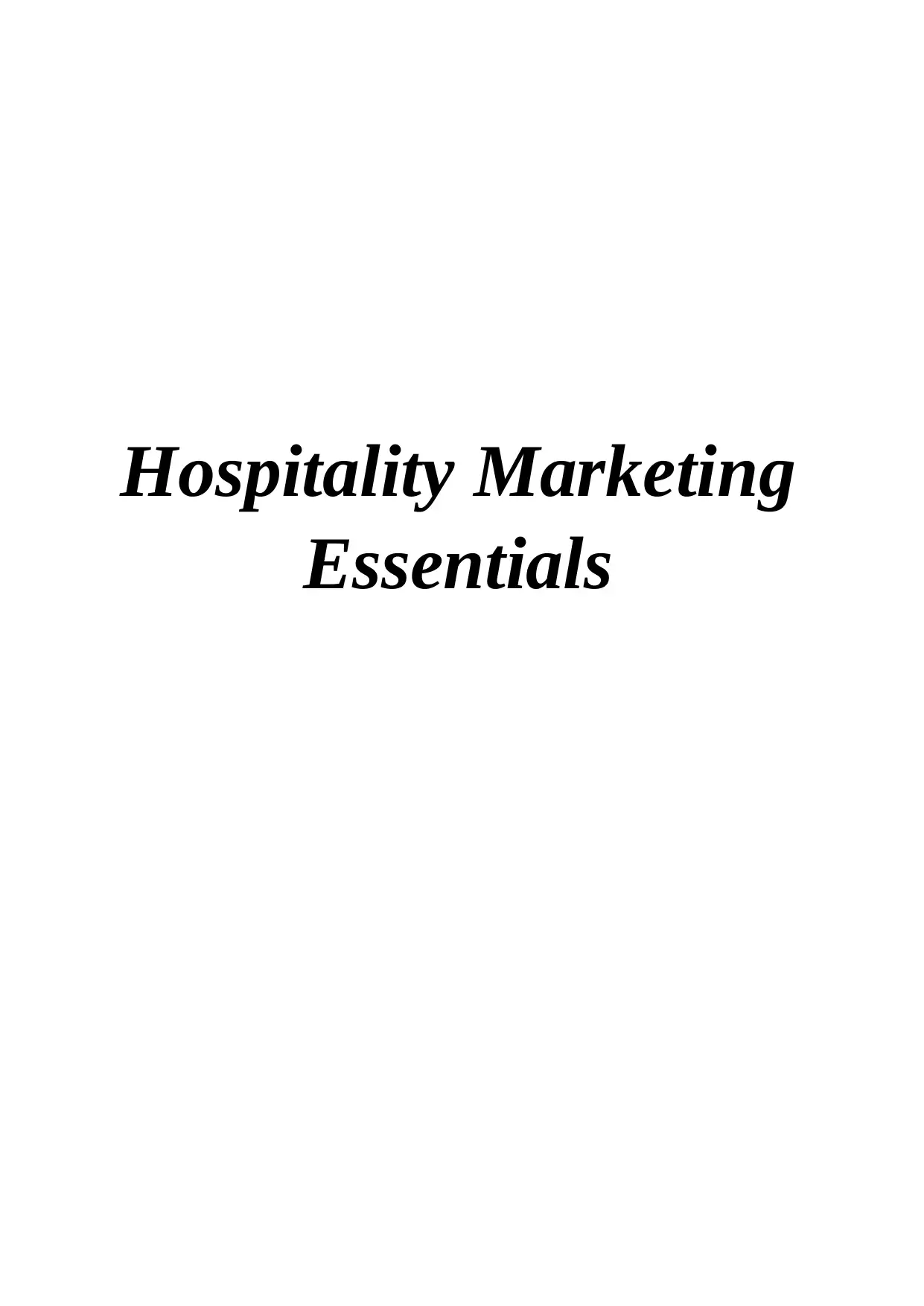
Hospitality Marketing
Essentials
Essentials
Paraphrase This Document
Need a fresh take? Get an instant paraphrase of this document with our AI Paraphraser
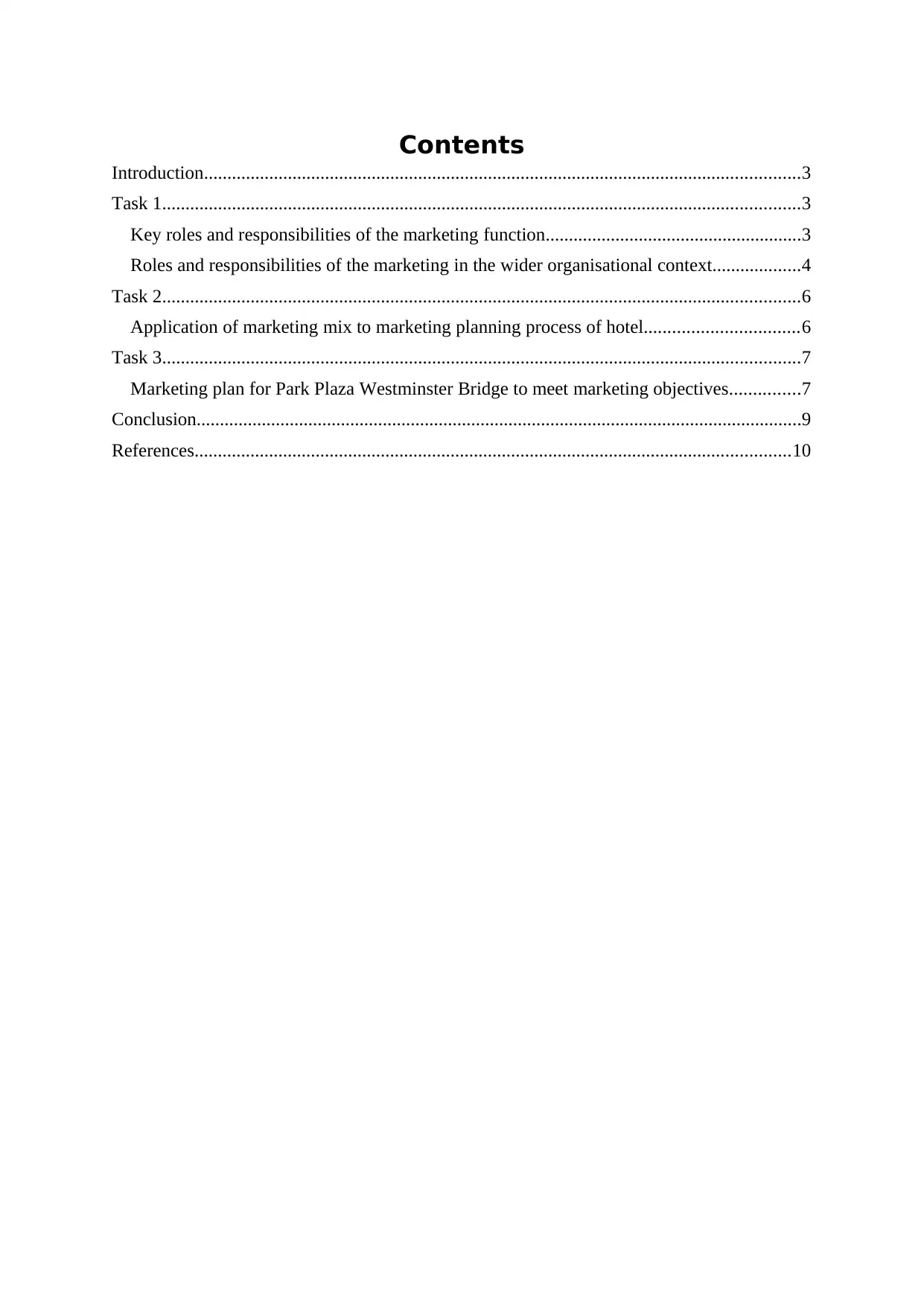
Contents
Introduction................................................................................................................................3
Task 1.........................................................................................................................................3
Key roles and responsibilities of the marketing function.......................................................3
Roles and responsibilities of the marketing in the wider organisational context...................4
Task 2.........................................................................................................................................6
Application of marketing mix to marketing planning process of hotel.................................6
Task 3.........................................................................................................................................7
Marketing plan for Park Plaza Westminster Bridge to meet marketing objectives...............7
Conclusion..................................................................................................................................9
References................................................................................................................................10
Introduction................................................................................................................................3
Task 1.........................................................................................................................................3
Key roles and responsibilities of the marketing function.......................................................3
Roles and responsibilities of the marketing in the wider organisational context...................4
Task 2.........................................................................................................................................6
Application of marketing mix to marketing planning process of hotel.................................6
Task 3.........................................................................................................................................7
Marketing plan for Park Plaza Westminster Bridge to meet marketing objectives...............7
Conclusion..................................................................................................................................9
References................................................................................................................................10
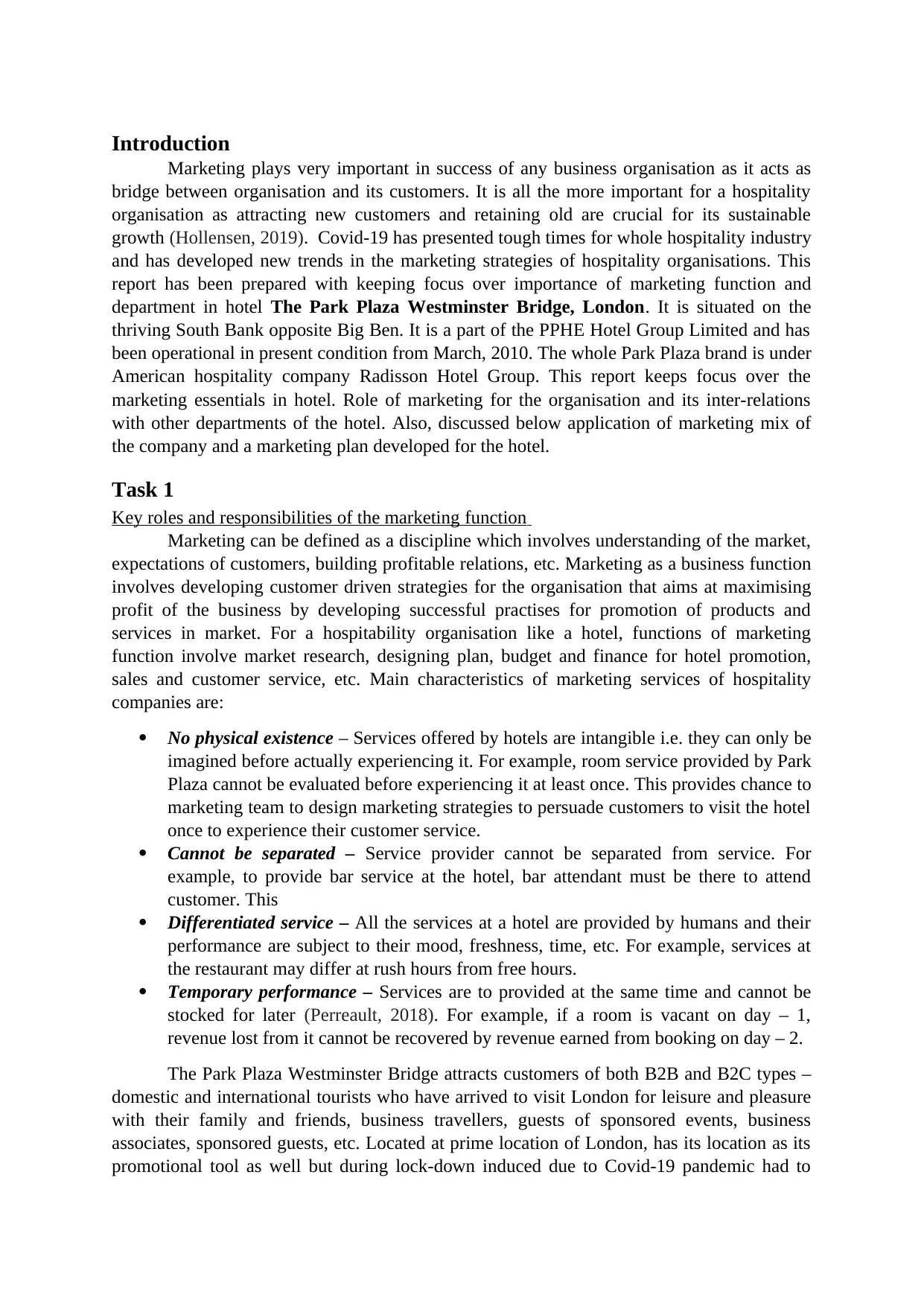
Introduction
Marketing plays very important in success of any business organisation as it acts as
bridge between organisation and its customers. It is all the more important for a hospitality
organisation as attracting new customers and retaining old are crucial for its sustainable
growth (Hollensen, 2019). Covid-19 has presented tough times for whole hospitality industry
and has developed new trends in the marketing strategies of hospitality organisations. This
report has been prepared with keeping focus over importance of marketing function and
department in hotel The Park Plaza Westminster Bridge, London. It is situated on the
thriving South Bank opposite Big Ben. It is a part of the PPHE Hotel Group Limited and has
been operational in present condition from March, 2010. The whole Park Plaza brand is under
American hospitality company Radisson Hotel Group. This report keeps focus over the
marketing essentials in hotel. Role of marketing for the organisation and its inter-relations
with other departments of the hotel. Also, discussed below application of marketing mix of
the company and a marketing plan developed for the hotel.
Task 1
Key roles and responsibilities of the marketing function
Marketing can be defined as a discipline which involves understanding of the market,
expectations of customers, building profitable relations, etc. Marketing as a business function
involves developing customer driven strategies for the organisation that aims at maximising
profit of the business by developing successful practises for promotion of products and
services in market. For a hospitability organisation like a hotel, functions of marketing
function involve market research, designing plan, budget and finance for hotel promotion,
sales and customer service, etc. Main characteristics of marketing services of hospitality
companies are:
No physical existence – Services offered by hotels are intangible i.e. they can only be
imagined before actually experiencing it. For example, room service provided by Park
Plaza cannot be evaluated before experiencing it at least once. This provides chance to
marketing team to design marketing strategies to persuade customers to visit the hotel
once to experience their customer service.
Cannot be separated – Service provider cannot be separated from service. For
example, to provide bar service at the hotel, bar attendant must be there to attend
customer. This
Differentiated service – All the services at a hotel are provided by humans and their
performance are subject to their mood, freshness, time, etc. For example, services at
the restaurant may differ at rush hours from free hours.
Temporary performance – Services are to provided at the same time and cannot be
stocked for later (Perreault, 2018). For example, if a room is vacant on day – 1,
revenue lost from it cannot be recovered by revenue earned from booking on day – 2.
The Park Plaza Westminster Bridge attracts customers of both B2B and B2C types –
domestic and international tourists who have arrived to visit London for leisure and pleasure
with their family and friends, business travellers, guests of sponsored events, business
associates, sponsored guests, etc. Located at prime location of London, has its location as its
promotional tool as well but during lock-down induced due to Covid-19 pandemic had to
Marketing plays very important in success of any business organisation as it acts as
bridge between organisation and its customers. It is all the more important for a hospitality
organisation as attracting new customers and retaining old are crucial for its sustainable
growth (Hollensen, 2019). Covid-19 has presented tough times for whole hospitality industry
and has developed new trends in the marketing strategies of hospitality organisations. This
report has been prepared with keeping focus over importance of marketing function and
department in hotel The Park Plaza Westminster Bridge, London. It is situated on the
thriving South Bank opposite Big Ben. It is a part of the PPHE Hotel Group Limited and has
been operational in present condition from March, 2010. The whole Park Plaza brand is under
American hospitality company Radisson Hotel Group. This report keeps focus over the
marketing essentials in hotel. Role of marketing for the organisation and its inter-relations
with other departments of the hotel. Also, discussed below application of marketing mix of
the company and a marketing plan developed for the hotel.
Task 1
Key roles and responsibilities of the marketing function
Marketing can be defined as a discipline which involves understanding of the market,
expectations of customers, building profitable relations, etc. Marketing as a business function
involves developing customer driven strategies for the organisation that aims at maximising
profit of the business by developing successful practises for promotion of products and
services in market. For a hospitability organisation like a hotel, functions of marketing
function involve market research, designing plan, budget and finance for hotel promotion,
sales and customer service, etc. Main characteristics of marketing services of hospitality
companies are:
No physical existence – Services offered by hotels are intangible i.e. they can only be
imagined before actually experiencing it. For example, room service provided by Park
Plaza cannot be evaluated before experiencing it at least once. This provides chance to
marketing team to design marketing strategies to persuade customers to visit the hotel
once to experience their customer service.
Cannot be separated – Service provider cannot be separated from service. For
example, to provide bar service at the hotel, bar attendant must be there to attend
customer. This
Differentiated service – All the services at a hotel are provided by humans and their
performance are subject to their mood, freshness, time, etc. For example, services at
the restaurant may differ at rush hours from free hours.
Temporary performance – Services are to provided at the same time and cannot be
stocked for later (Perreault, 2018). For example, if a room is vacant on day – 1,
revenue lost from it cannot be recovered by revenue earned from booking on day – 2.
The Park Plaza Westminster Bridge attracts customers of both B2B and B2C types –
domestic and international tourists who have arrived to visit London for leisure and pleasure
with their family and friends, business travellers, guests of sponsored events, business
associates, sponsored guests, etc. Located at prime location of London, has its location as its
promotional tool as well but during lock-down induced due to Covid-19 pandemic had to
⊘ This is a preview!⊘
Do you want full access?
Subscribe today to unlock all pages.

Trusted by 1+ million students worldwide
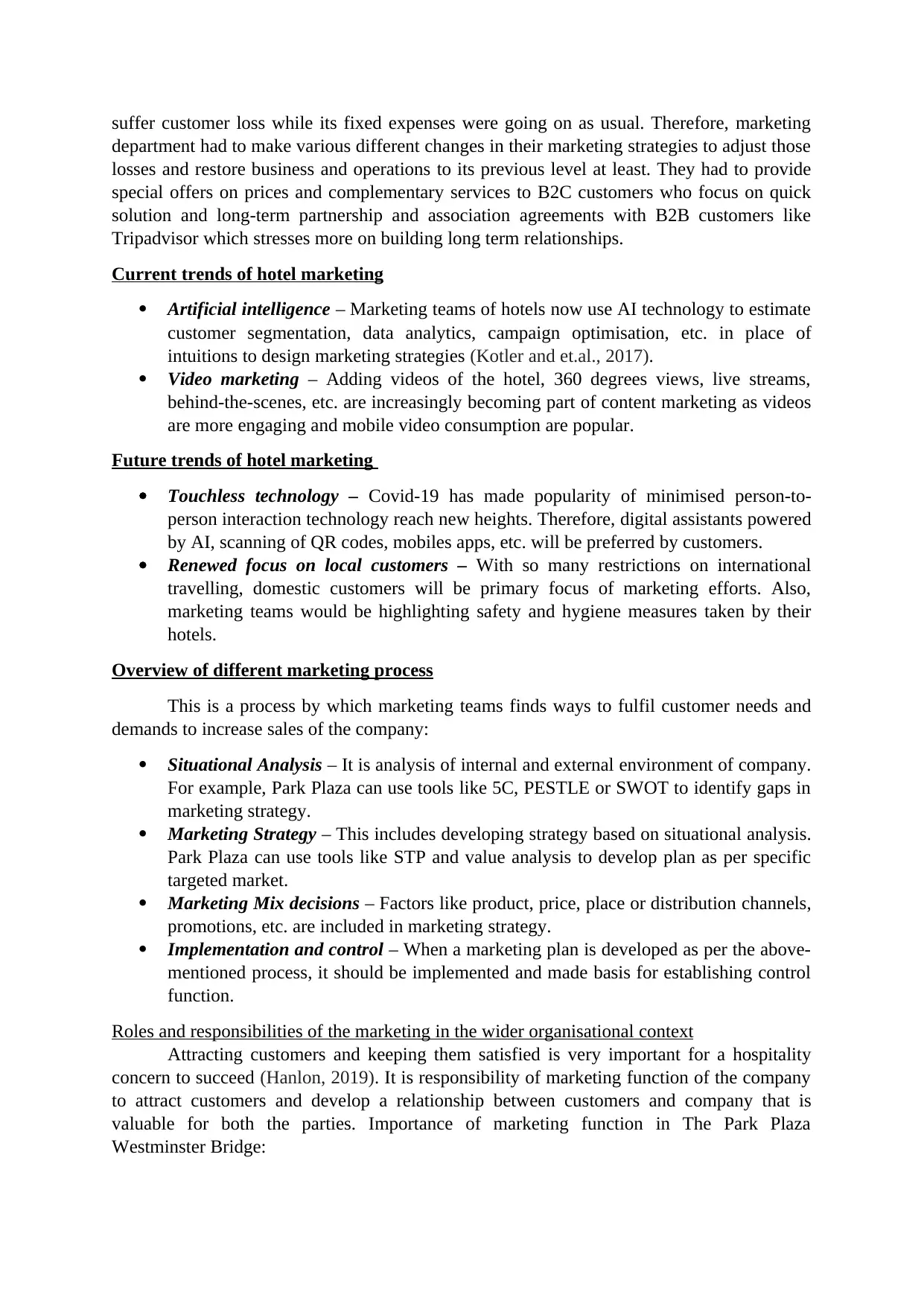
suffer customer loss while its fixed expenses were going on as usual. Therefore, marketing
department had to make various different changes in their marketing strategies to adjust those
losses and restore business and operations to its previous level at least. They had to provide
special offers on prices and complementary services to B2C customers who focus on quick
solution and long-term partnership and association agreements with B2B customers like
Tripadvisor which stresses more on building long term relationships.
Current trends of hotel marketing
Artificial intelligence – Marketing teams of hotels now use AI technology to estimate
customer segmentation, data analytics, campaign optimisation, etc. in place of
intuitions to design marketing strategies (Kotler and et.al., 2017).
Video marketing – Adding videos of the hotel, 360 degrees views, live streams,
behind-the-scenes, etc. are increasingly becoming part of content marketing as videos
are more engaging and mobile video consumption are popular.
Future trends of hotel marketing
Touchless technology – Covid-19 has made popularity of minimised person-to-
person interaction technology reach new heights. Therefore, digital assistants powered
by AI, scanning of QR codes, mobiles apps, etc. will be preferred by customers.
Renewed focus on local customers – With so many restrictions on international
travelling, domestic customers will be primary focus of marketing efforts. Also,
marketing teams would be highlighting safety and hygiene measures taken by their
hotels.
Overview of different marketing process
This is a process by which marketing teams finds ways to fulfil customer needs and
demands to increase sales of the company:
Situational Analysis – It is analysis of internal and external environment of company.
For example, Park Plaza can use tools like 5C, PESTLE or SWOT to identify gaps in
marketing strategy.
Marketing Strategy – This includes developing strategy based on situational analysis.
Park Plaza can use tools like STP and value analysis to develop plan as per specific
targeted market.
Marketing Mix decisions – Factors like product, price, place or distribution channels,
promotions, etc. are included in marketing strategy.
Implementation and control – When a marketing plan is developed as per the above-
mentioned process, it should be implemented and made basis for establishing control
function.
Roles and responsibilities of the marketing in the wider organisational context
Attracting customers and keeping them satisfied is very important for a hospitality
concern to succeed (Hanlon, 2019). It is responsibility of marketing function of the company
to attract customers and develop a relationship between customers and company that is
valuable for both the parties. Importance of marketing function in The Park Plaza
Westminster Bridge:
department had to make various different changes in their marketing strategies to adjust those
losses and restore business and operations to its previous level at least. They had to provide
special offers on prices and complementary services to B2C customers who focus on quick
solution and long-term partnership and association agreements with B2B customers like
Tripadvisor which stresses more on building long term relationships.
Current trends of hotel marketing
Artificial intelligence – Marketing teams of hotels now use AI technology to estimate
customer segmentation, data analytics, campaign optimisation, etc. in place of
intuitions to design marketing strategies (Kotler and et.al., 2017).
Video marketing – Adding videos of the hotel, 360 degrees views, live streams,
behind-the-scenes, etc. are increasingly becoming part of content marketing as videos
are more engaging and mobile video consumption are popular.
Future trends of hotel marketing
Touchless technology – Covid-19 has made popularity of minimised person-to-
person interaction technology reach new heights. Therefore, digital assistants powered
by AI, scanning of QR codes, mobiles apps, etc. will be preferred by customers.
Renewed focus on local customers – With so many restrictions on international
travelling, domestic customers will be primary focus of marketing efforts. Also,
marketing teams would be highlighting safety and hygiene measures taken by their
hotels.
Overview of different marketing process
This is a process by which marketing teams finds ways to fulfil customer needs and
demands to increase sales of the company:
Situational Analysis – It is analysis of internal and external environment of company.
For example, Park Plaza can use tools like 5C, PESTLE or SWOT to identify gaps in
marketing strategy.
Marketing Strategy – This includes developing strategy based on situational analysis.
Park Plaza can use tools like STP and value analysis to develop plan as per specific
targeted market.
Marketing Mix decisions – Factors like product, price, place or distribution channels,
promotions, etc. are included in marketing strategy.
Implementation and control – When a marketing plan is developed as per the above-
mentioned process, it should be implemented and made basis for establishing control
function.
Roles and responsibilities of the marketing in the wider organisational context
Attracting customers and keeping them satisfied is very important for a hospitality
concern to succeed (Hanlon, 2019). It is responsibility of marketing function of the company
to attract customers and develop a relationship between customers and company that is
valuable for both the parties. Importance of marketing function in The Park Plaza
Westminster Bridge:
Paraphrase This Document
Need a fresh take? Get an instant paraphrase of this document with our AI Paraphraser
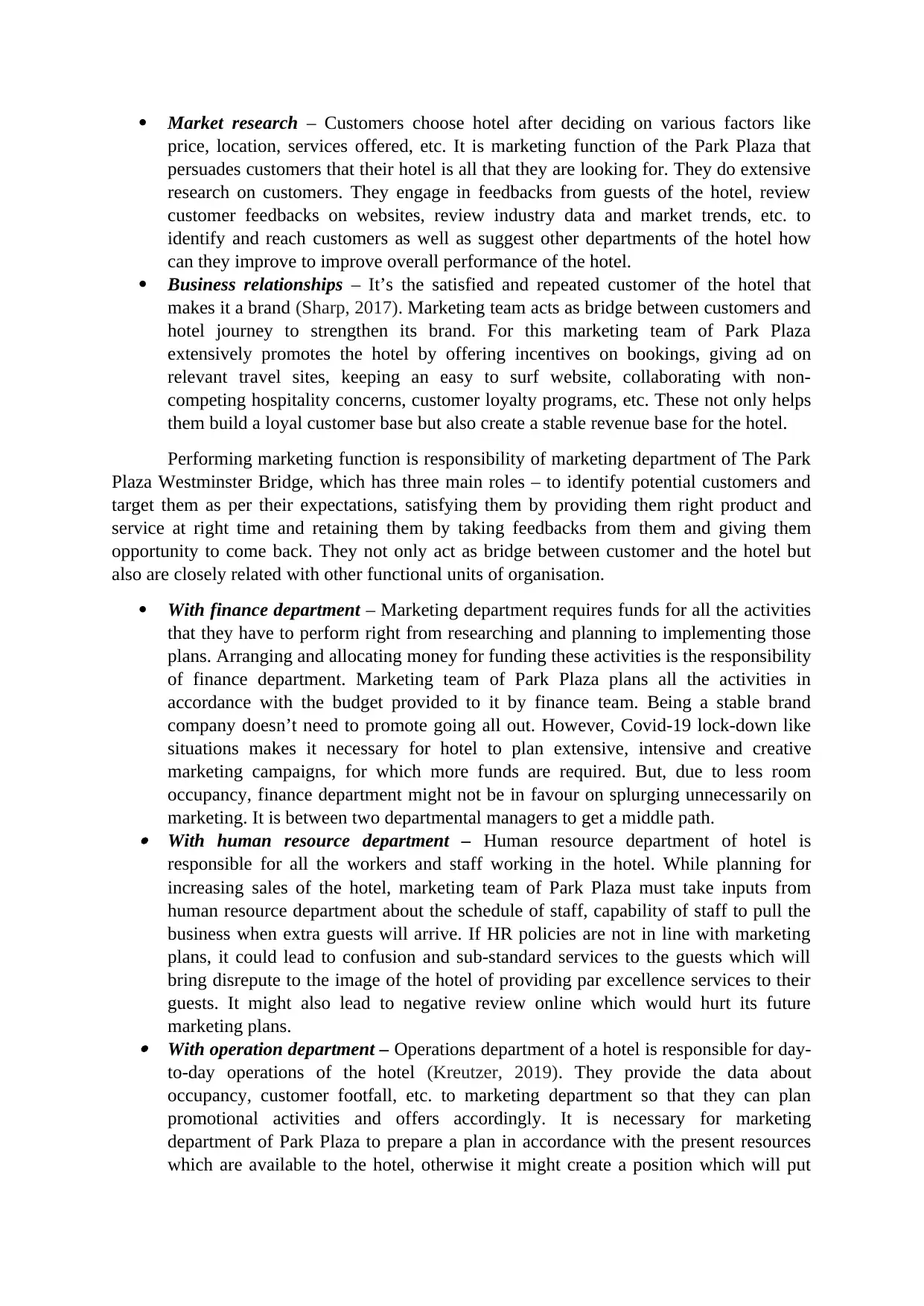
Market research – Customers choose hotel after deciding on various factors like
price, location, services offered, etc. It is marketing function of the Park Plaza that
persuades customers that their hotel is all that they are looking for. They do extensive
research on customers. They engage in feedbacks from guests of the hotel, review
customer feedbacks on websites, review industry data and market trends, etc. to
identify and reach customers as well as suggest other departments of the hotel how
can they improve to improve overall performance of the hotel.
Business relationships – It’s the satisfied and repeated customer of the hotel that
makes it a brand (Sharp, 2017). Marketing team acts as bridge between customers and
hotel journey to strengthen its brand. For this marketing team of Park Plaza
extensively promotes the hotel by offering incentives on bookings, giving ad on
relevant travel sites, keeping an easy to surf website, collaborating with non-
competing hospitality concerns, customer loyalty programs, etc. These not only helps
them build a loyal customer base but also create a stable revenue base for the hotel.
Performing marketing function is responsibility of marketing department of The Park
Plaza Westminster Bridge, which has three main roles – to identify potential customers and
target them as per their expectations, satisfying them by providing them right product and
service at right time and retaining them by taking feedbacks from them and giving them
opportunity to come back. They not only act as bridge between customer and the hotel but
also are closely related with other functional units of organisation.
With finance department – Marketing department requires funds for all the activities
that they have to perform right from researching and planning to implementing those
plans. Arranging and allocating money for funding these activities is the responsibility
of finance department. Marketing team of Park Plaza plans all the activities in
accordance with the budget provided to it by finance team. Being a stable brand
company doesn’t need to promote going all out. However, Covid-19 lock-down like
situations makes it necessary for hotel to plan extensive, intensive and creative
marketing campaigns, for which more funds are required. But, due to less room
occupancy, finance department might not be in favour on splurging unnecessarily on
marketing. It is between two departmental managers to get a middle path.
With human resource department – Human resource department of hotel is
responsible for all the workers and staff working in the hotel. While planning for
increasing sales of the hotel, marketing team of Park Plaza must take inputs from
human resource department about the schedule of staff, capability of staff to pull the
business when extra guests will arrive. If HR policies are not in line with marketing
plans, it could lead to confusion and sub-standard services to the guests which will
bring disrepute to the image of the hotel of providing par excellence services to their
guests. It might also lead to negative review online which would hurt its future
marketing plans.
With operation department – Operations department of a hotel is responsible for day-
to-day operations of the hotel (Kreutzer, 2019). They provide the data about
occupancy, customer footfall, etc. to marketing department so that they can plan
promotional activities and offers accordingly. It is necessary for marketing
department of Park Plaza to prepare a plan in accordance with the present resources
which are available to the hotel, otherwise it might create a position which will put
price, location, services offered, etc. It is marketing function of the Park Plaza that
persuades customers that their hotel is all that they are looking for. They do extensive
research on customers. They engage in feedbacks from guests of the hotel, review
customer feedbacks on websites, review industry data and market trends, etc. to
identify and reach customers as well as suggest other departments of the hotel how
can they improve to improve overall performance of the hotel.
Business relationships – It’s the satisfied and repeated customer of the hotel that
makes it a brand (Sharp, 2017). Marketing team acts as bridge between customers and
hotel journey to strengthen its brand. For this marketing team of Park Plaza
extensively promotes the hotel by offering incentives on bookings, giving ad on
relevant travel sites, keeping an easy to surf website, collaborating with non-
competing hospitality concerns, customer loyalty programs, etc. These not only helps
them build a loyal customer base but also create a stable revenue base for the hotel.
Performing marketing function is responsibility of marketing department of The Park
Plaza Westminster Bridge, which has three main roles – to identify potential customers and
target them as per their expectations, satisfying them by providing them right product and
service at right time and retaining them by taking feedbacks from them and giving them
opportunity to come back. They not only act as bridge between customer and the hotel but
also are closely related with other functional units of organisation.
With finance department – Marketing department requires funds for all the activities
that they have to perform right from researching and planning to implementing those
plans. Arranging and allocating money for funding these activities is the responsibility
of finance department. Marketing team of Park Plaza plans all the activities in
accordance with the budget provided to it by finance team. Being a stable brand
company doesn’t need to promote going all out. However, Covid-19 lock-down like
situations makes it necessary for hotel to plan extensive, intensive and creative
marketing campaigns, for which more funds are required. But, due to less room
occupancy, finance department might not be in favour on splurging unnecessarily on
marketing. It is between two departmental managers to get a middle path.
With human resource department – Human resource department of hotel is
responsible for all the workers and staff working in the hotel. While planning for
increasing sales of the hotel, marketing team of Park Plaza must take inputs from
human resource department about the schedule of staff, capability of staff to pull the
business when extra guests will arrive. If HR policies are not in line with marketing
plans, it could lead to confusion and sub-standard services to the guests which will
bring disrepute to the image of the hotel of providing par excellence services to their
guests. It might also lead to negative review online which would hurt its future
marketing plans.
With operation department – Operations department of a hotel is responsible for day-
to-day operations of the hotel (Kreutzer, 2019). They provide the data about
occupancy, customer footfall, etc. to marketing department so that they can plan
promotional activities and offers accordingly. It is necessary for marketing
department of Park Plaza to prepare a plan in accordance with the present resources
which are available to the hotel, otherwise it might create a position which will put
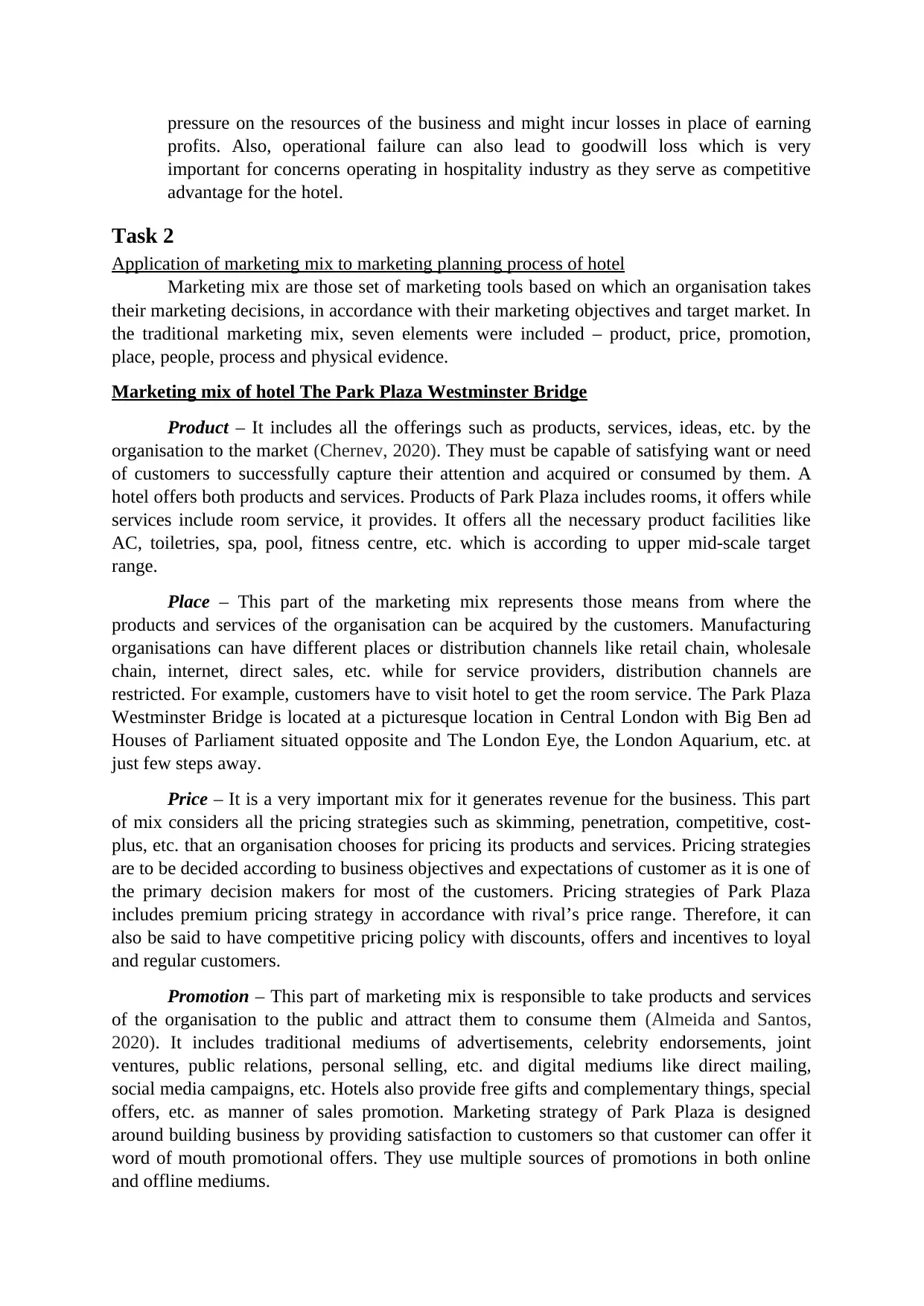
pressure on the resources of the business and might incur losses in place of earning
profits. Also, operational failure can also lead to goodwill loss which is very
important for concerns operating in hospitality industry as they serve as competitive
advantage for the hotel.
Task 2
Application of marketing mix to marketing planning process of hotel
Marketing mix are those set of marketing tools based on which an organisation takes
their marketing decisions, in accordance with their marketing objectives and target market. In
the traditional marketing mix, seven elements were included – product, price, promotion,
place, people, process and physical evidence.
Marketing mix of hotel The Park Plaza Westminster Bridge
Product – It includes all the offerings such as products, services, ideas, etc. by the
organisation to the market (Chernev, 2020). They must be capable of satisfying want or need
of customers to successfully capture their attention and acquired or consumed by them. A
hotel offers both products and services. Products of Park Plaza includes rooms, it offers while
services include room service, it provides. It offers all the necessary product facilities like
AC, toiletries, spa, pool, fitness centre, etc. which is according to upper mid-scale target
range.
Place – This part of the marketing mix represents those means from where the
products and services of the organisation can be acquired by the customers. Manufacturing
organisations can have different places or distribution channels like retail chain, wholesale
chain, internet, direct sales, etc. while for service providers, distribution channels are
restricted. For example, customers have to visit hotel to get the room service. The Park Plaza
Westminster Bridge is located at a picturesque location in Central London with Big Ben ad
Houses of Parliament situated opposite and The London Eye, the London Aquarium, etc. at
just few steps away.
Price – It is a very important mix for it generates revenue for the business. This part
of mix considers all the pricing strategies such as skimming, penetration, competitive, cost-
plus, etc. that an organisation chooses for pricing its products and services. Pricing strategies
are to be decided according to business objectives and expectations of customer as it is one of
the primary decision makers for most of the customers. Pricing strategies of Park Plaza
includes premium pricing strategy in accordance with rival’s price range. Therefore, it can
also be said to have competitive pricing policy with discounts, offers and incentives to loyal
and regular customers.
Promotion – This part of marketing mix is responsible to take products and services
of the organisation to the public and attract them to consume them (Almeida and Santos,
2020). It includes traditional mediums of advertisements, celebrity endorsements, joint
ventures, public relations, personal selling, etc. and digital mediums like direct mailing,
social media campaigns, etc. Hotels also provide free gifts and complementary things, special
offers, etc. as manner of sales promotion. Marketing strategy of Park Plaza is designed
around building business by providing satisfaction to customers so that customer can offer it
word of mouth promotional offers. They use multiple sources of promotions in both online
and offline mediums.
profits. Also, operational failure can also lead to goodwill loss which is very
important for concerns operating in hospitality industry as they serve as competitive
advantage for the hotel.
Task 2
Application of marketing mix to marketing planning process of hotel
Marketing mix are those set of marketing tools based on which an organisation takes
their marketing decisions, in accordance with their marketing objectives and target market. In
the traditional marketing mix, seven elements were included – product, price, promotion,
place, people, process and physical evidence.
Marketing mix of hotel The Park Plaza Westminster Bridge
Product – It includes all the offerings such as products, services, ideas, etc. by the
organisation to the market (Chernev, 2020). They must be capable of satisfying want or need
of customers to successfully capture their attention and acquired or consumed by them. A
hotel offers both products and services. Products of Park Plaza includes rooms, it offers while
services include room service, it provides. It offers all the necessary product facilities like
AC, toiletries, spa, pool, fitness centre, etc. which is according to upper mid-scale target
range.
Place – This part of the marketing mix represents those means from where the
products and services of the organisation can be acquired by the customers. Manufacturing
organisations can have different places or distribution channels like retail chain, wholesale
chain, internet, direct sales, etc. while for service providers, distribution channels are
restricted. For example, customers have to visit hotel to get the room service. The Park Plaza
Westminster Bridge is located at a picturesque location in Central London with Big Ben ad
Houses of Parliament situated opposite and The London Eye, the London Aquarium, etc. at
just few steps away.
Price – It is a very important mix for it generates revenue for the business. This part
of mix considers all the pricing strategies such as skimming, penetration, competitive, cost-
plus, etc. that an organisation chooses for pricing its products and services. Pricing strategies
are to be decided according to business objectives and expectations of customer as it is one of
the primary decision makers for most of the customers. Pricing strategies of Park Plaza
includes premium pricing strategy in accordance with rival’s price range. Therefore, it can
also be said to have competitive pricing policy with discounts, offers and incentives to loyal
and regular customers.
Promotion – This part of marketing mix is responsible to take products and services
of the organisation to the public and attract them to consume them (Almeida and Santos,
2020). It includes traditional mediums of advertisements, celebrity endorsements, joint
ventures, public relations, personal selling, etc. and digital mediums like direct mailing,
social media campaigns, etc. Hotels also provide free gifts and complementary things, special
offers, etc. as manner of sales promotion. Marketing strategy of Park Plaza is designed
around building business by providing satisfaction to customers so that customer can offer it
word of mouth promotional offers. They use multiple sources of promotions in both online
and offline mediums.
⊘ This is a preview!⊘
Do you want full access?
Subscribe today to unlock all pages.

Trusted by 1+ million students worldwide
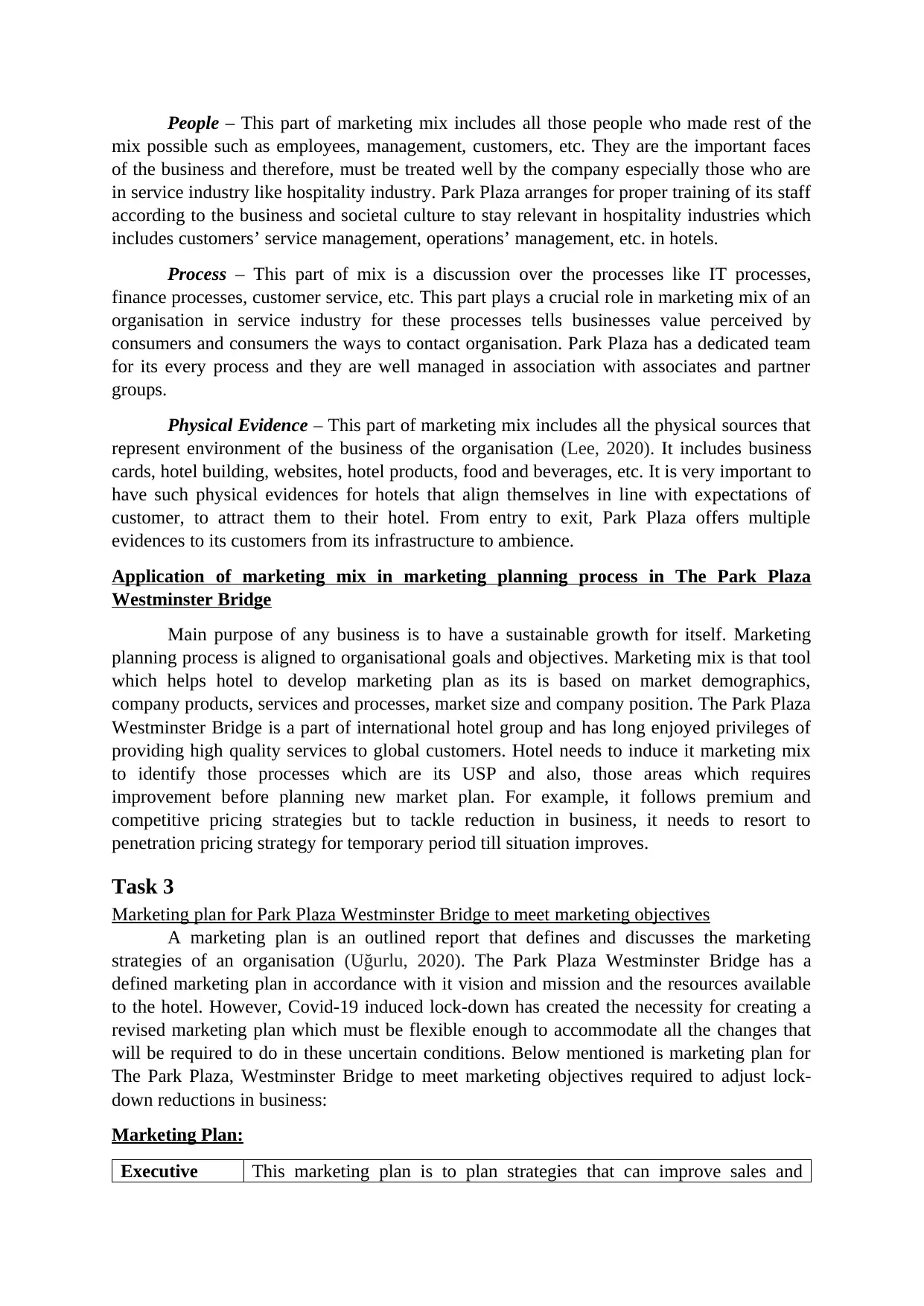
People – This part of marketing mix includes all those people who made rest of the
mix possible such as employees, management, customers, etc. They are the important faces
of the business and therefore, must be treated well by the company especially those who are
in service industry like hospitality industry. Park Plaza arranges for proper training of its staff
according to the business and societal culture to stay relevant in hospitality industries which
includes customers’ service management, operations’ management, etc. in hotels.
Process – This part of mix is a discussion over the processes like IT processes,
finance processes, customer service, etc. This part plays a crucial role in marketing mix of an
organisation in service industry for these processes tells businesses value perceived by
consumers and consumers the ways to contact organisation. Park Plaza has a dedicated team
for its every process and they are well managed in association with associates and partner
groups.
Physical Evidence – This part of marketing mix includes all the physical sources that
represent environment of the business of the organisation (Lee, 2020). It includes business
cards, hotel building, websites, hotel products, food and beverages, etc. It is very important to
have such physical evidences for hotels that align themselves in line with expectations of
customer, to attract them to their hotel. From entry to exit, Park Plaza offers multiple
evidences to its customers from its infrastructure to ambience.
Application of marketing mix in marketing planning process in The Park Plaza
Westminster Bridge
Main purpose of any business is to have a sustainable growth for itself. Marketing
planning process is aligned to organisational goals and objectives. Marketing mix is that tool
which helps hotel to develop marketing plan as its is based on market demographics,
company products, services and processes, market size and company position. The Park Plaza
Westminster Bridge is a part of international hotel group and has long enjoyed privileges of
providing high quality services to global customers. Hotel needs to induce it marketing mix
to identify those processes which are its USP and also, those areas which requires
improvement before planning new market plan. For example, it follows premium and
competitive pricing strategies but to tackle reduction in business, it needs to resort to
penetration pricing strategy for temporary period till situation improves.
Task 3
Marketing plan for Park Plaza Westminster Bridge to meet marketing objectives
A marketing plan is an outlined report that defines and discusses the marketing
strategies of an organisation (Uğurlu, 2020). The Park Plaza Westminster Bridge has a
defined marketing plan in accordance with it vision and mission and the resources available
to the hotel. However, Covid-19 induced lock-down has created the necessity for creating a
revised marketing plan which must be flexible enough to accommodate all the changes that
will be required to do in these uncertain conditions. Below mentioned is marketing plan for
The Park Plaza, Westminster Bridge to meet marketing objectives required to adjust lock-
down reductions in business:
Marketing Plan:
Executive This marketing plan is to plan strategies that can improve sales and
mix possible such as employees, management, customers, etc. They are the important faces
of the business and therefore, must be treated well by the company especially those who are
in service industry like hospitality industry. Park Plaza arranges for proper training of its staff
according to the business and societal culture to stay relevant in hospitality industries which
includes customers’ service management, operations’ management, etc. in hotels.
Process – This part of mix is a discussion over the processes like IT processes,
finance processes, customer service, etc. This part plays a crucial role in marketing mix of an
organisation in service industry for these processes tells businesses value perceived by
consumers and consumers the ways to contact organisation. Park Plaza has a dedicated team
for its every process and they are well managed in association with associates and partner
groups.
Physical Evidence – This part of marketing mix includes all the physical sources that
represent environment of the business of the organisation (Lee, 2020). It includes business
cards, hotel building, websites, hotel products, food and beverages, etc. It is very important to
have such physical evidences for hotels that align themselves in line with expectations of
customer, to attract them to their hotel. From entry to exit, Park Plaza offers multiple
evidences to its customers from its infrastructure to ambience.
Application of marketing mix in marketing planning process in The Park Plaza
Westminster Bridge
Main purpose of any business is to have a sustainable growth for itself. Marketing
planning process is aligned to organisational goals and objectives. Marketing mix is that tool
which helps hotel to develop marketing plan as its is based on market demographics,
company products, services and processes, market size and company position. The Park Plaza
Westminster Bridge is a part of international hotel group and has long enjoyed privileges of
providing high quality services to global customers. Hotel needs to induce it marketing mix
to identify those processes which are its USP and also, those areas which requires
improvement before planning new market plan. For example, it follows premium and
competitive pricing strategies but to tackle reduction in business, it needs to resort to
penetration pricing strategy for temporary period till situation improves.
Task 3
Marketing plan for Park Plaza Westminster Bridge to meet marketing objectives
A marketing plan is an outlined report that defines and discusses the marketing
strategies of an organisation (Uğurlu, 2020). The Park Plaza Westminster Bridge has a
defined marketing plan in accordance with it vision and mission and the resources available
to the hotel. However, Covid-19 induced lock-down has created the necessity for creating a
revised marketing plan which must be flexible enough to accommodate all the changes that
will be required to do in these uncertain conditions. Below mentioned is marketing plan for
The Park Plaza, Westminster Bridge to meet marketing objectives required to adjust lock-
down reductions in business:
Marketing Plan:
Executive This marketing plan is to plan strategies that can improve sales and
Paraphrase This Document
Need a fresh take? Get an instant paraphrase of this document with our AI Paraphraser
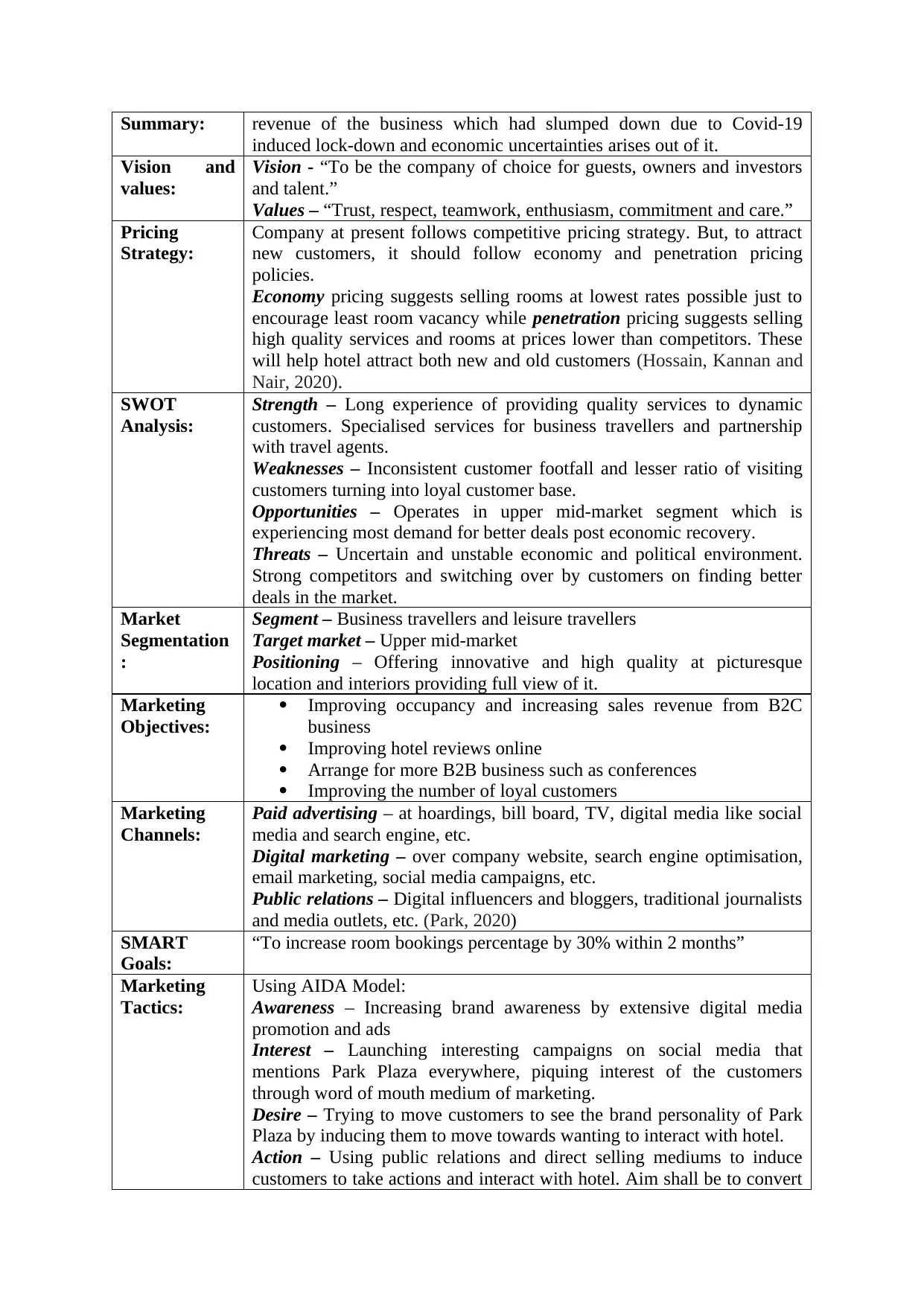
Summary: revenue of the business which had slumped down due to Covid-19
induced lock-down and economic uncertainties arises out of it.
Vision and
values:
Vision - “To be the company of choice for guests, owners and investors
and talent.”
Values – “Trust, respect, teamwork, enthusiasm, commitment and care.”
Pricing
Strategy:
Company at present follows competitive pricing strategy. But, to attract
new customers, it should follow economy and penetration pricing
policies.
Economy pricing suggests selling rooms at lowest rates possible just to
encourage least room vacancy while penetration pricing suggests selling
high quality services and rooms at prices lower than competitors. These
will help hotel attract both new and old customers (Hossain, Kannan and
Nair, 2020).
SWOT
Analysis:
Strength – Long experience of providing quality services to dynamic
customers. Specialised services for business travellers and partnership
with travel agents.
Weaknesses – Inconsistent customer footfall and lesser ratio of visiting
customers turning into loyal customer base.
Opportunities – Operates in upper mid-market segment which is
experiencing most demand for better deals post economic recovery.
Threats – Uncertain and unstable economic and political environment.
Strong competitors and switching over by customers on finding better
deals in the market.
Market
Segmentation
:
Segment – Business travellers and leisure travellers
Target market – Upper mid-market
Positioning – Offering innovative and high quality at picturesque
location and interiors providing full view of it.
Marketing
Objectives:
Improving occupancy and increasing sales revenue from B2C
business
Improving hotel reviews online
Arrange for more B2B business such as conferences
Improving the number of loyal customers
Marketing
Channels:
Paid advertising – at hoardings, bill board, TV, digital media like social
media and search engine, etc.
Digital marketing – over company website, search engine optimisation,
email marketing, social media campaigns, etc.
Public relations – Digital influencers and bloggers, traditional journalists
and media outlets, etc. (Park, 2020)
SMART
Goals:
“To increase room bookings percentage by 30% within 2 months”
Marketing
Tactics:
Using AIDA Model:
Awareness – Increasing brand awareness by extensive digital media
promotion and ads
Interest – Launching interesting campaigns on social media that
mentions Park Plaza everywhere, piquing interest of the customers
through word of mouth medium of marketing.
Desire – Trying to move customers to see the brand personality of Park
Plaza by inducing them to move towards wanting to interact with hotel.
Action – Using public relations and direct selling mediums to induce
customers to take actions and interact with hotel. Aim shall be to convert
induced lock-down and economic uncertainties arises out of it.
Vision and
values:
Vision - “To be the company of choice for guests, owners and investors
and talent.”
Values – “Trust, respect, teamwork, enthusiasm, commitment and care.”
Pricing
Strategy:
Company at present follows competitive pricing strategy. But, to attract
new customers, it should follow economy and penetration pricing
policies.
Economy pricing suggests selling rooms at lowest rates possible just to
encourage least room vacancy while penetration pricing suggests selling
high quality services and rooms at prices lower than competitors. These
will help hotel attract both new and old customers (Hossain, Kannan and
Nair, 2020).
SWOT
Analysis:
Strength – Long experience of providing quality services to dynamic
customers. Specialised services for business travellers and partnership
with travel agents.
Weaknesses – Inconsistent customer footfall and lesser ratio of visiting
customers turning into loyal customer base.
Opportunities – Operates in upper mid-market segment which is
experiencing most demand for better deals post economic recovery.
Threats – Uncertain and unstable economic and political environment.
Strong competitors and switching over by customers on finding better
deals in the market.
Market
Segmentation
:
Segment – Business travellers and leisure travellers
Target market – Upper mid-market
Positioning – Offering innovative and high quality at picturesque
location and interiors providing full view of it.
Marketing
Objectives:
Improving occupancy and increasing sales revenue from B2C
business
Improving hotel reviews online
Arrange for more B2B business such as conferences
Improving the number of loyal customers
Marketing
Channels:
Paid advertising – at hoardings, bill board, TV, digital media like social
media and search engine, etc.
Digital marketing – over company website, search engine optimisation,
email marketing, social media campaigns, etc.
Public relations – Digital influencers and bloggers, traditional journalists
and media outlets, etc. (Park, 2020)
SMART
Goals:
“To increase room bookings percentage by 30% within 2 months”
Marketing
Tactics:
Using AIDA Model:
Awareness – Increasing brand awareness by extensive digital media
promotion and ads
Interest – Launching interesting campaigns on social media that
mentions Park Plaza everywhere, piquing interest of the customers
through word of mouth medium of marketing.
Desire – Trying to move customers to see the brand personality of Park
Plaza by inducing them to move towards wanting to interact with hotel.
Action – Using public relations and direct selling mediums to induce
customers to take actions and interact with hotel. Aim shall be to convert
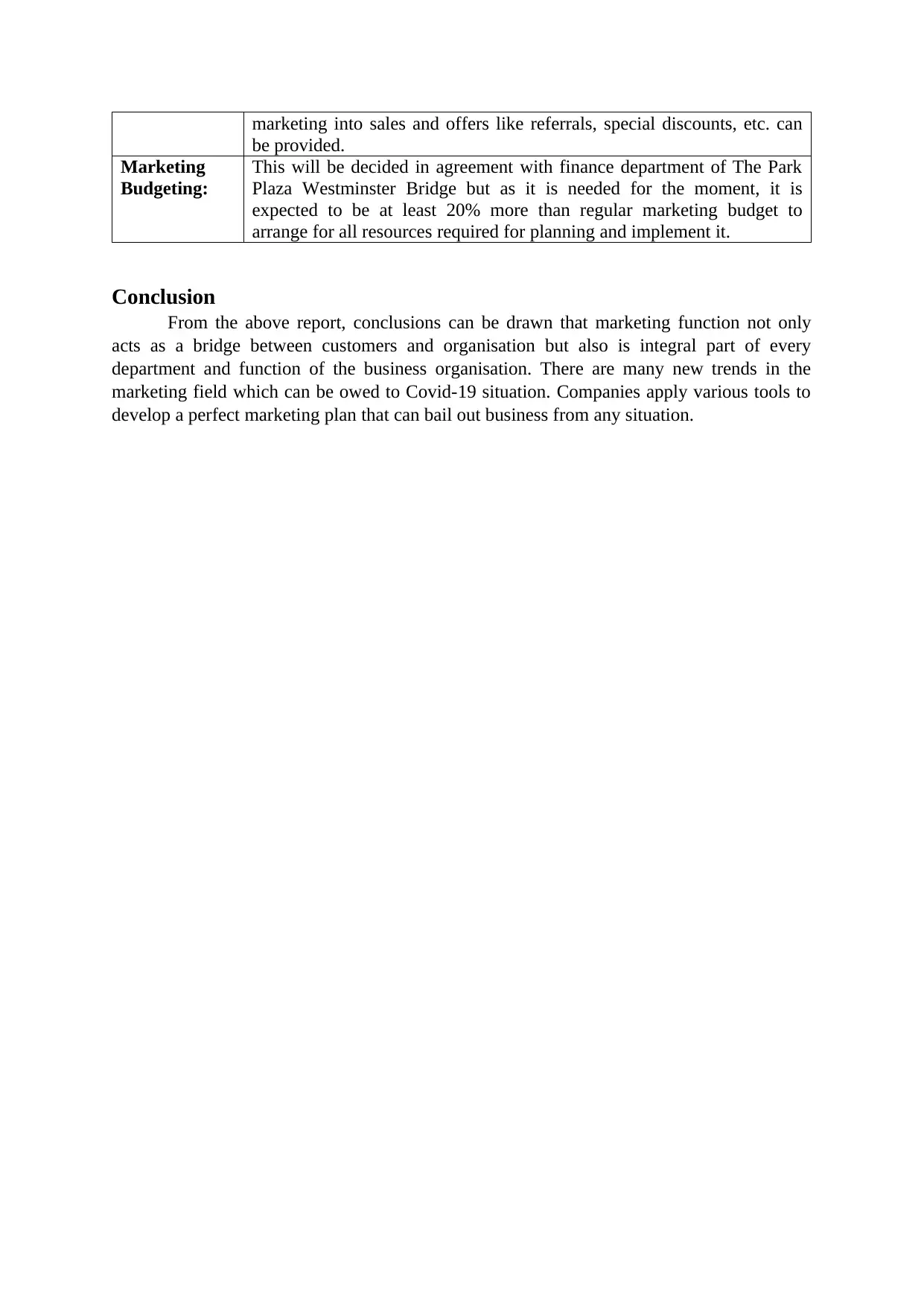
marketing into sales and offers like referrals, special discounts, etc. can
be provided.
Marketing
Budgeting:
This will be decided in agreement with finance department of The Park
Plaza Westminster Bridge but as it is needed for the moment, it is
expected to be at least 20% more than regular marketing budget to
arrange for all resources required for planning and implement it.
Conclusion
From the above report, conclusions can be drawn that marketing function not only
acts as a bridge between customers and organisation but also is integral part of every
department and function of the business organisation. There are many new trends in the
marketing field which can be owed to Covid-19 situation. Companies apply various tools to
develop a perfect marketing plan that can bail out business from any situation.
be provided.
Marketing
Budgeting:
This will be decided in agreement with finance department of The Park
Plaza Westminster Bridge but as it is needed for the moment, it is
expected to be at least 20% more than regular marketing budget to
arrange for all resources required for planning and implement it.
Conclusion
From the above report, conclusions can be drawn that marketing function not only
acts as a bridge between customers and organisation but also is integral part of every
department and function of the business organisation. There are many new trends in the
marketing field which can be owed to Covid-19 situation. Companies apply various tools to
develop a perfect marketing plan that can bail out business from any situation.
⊘ This is a preview!⊘
Do you want full access?
Subscribe today to unlock all pages.

Trusted by 1+ million students worldwide
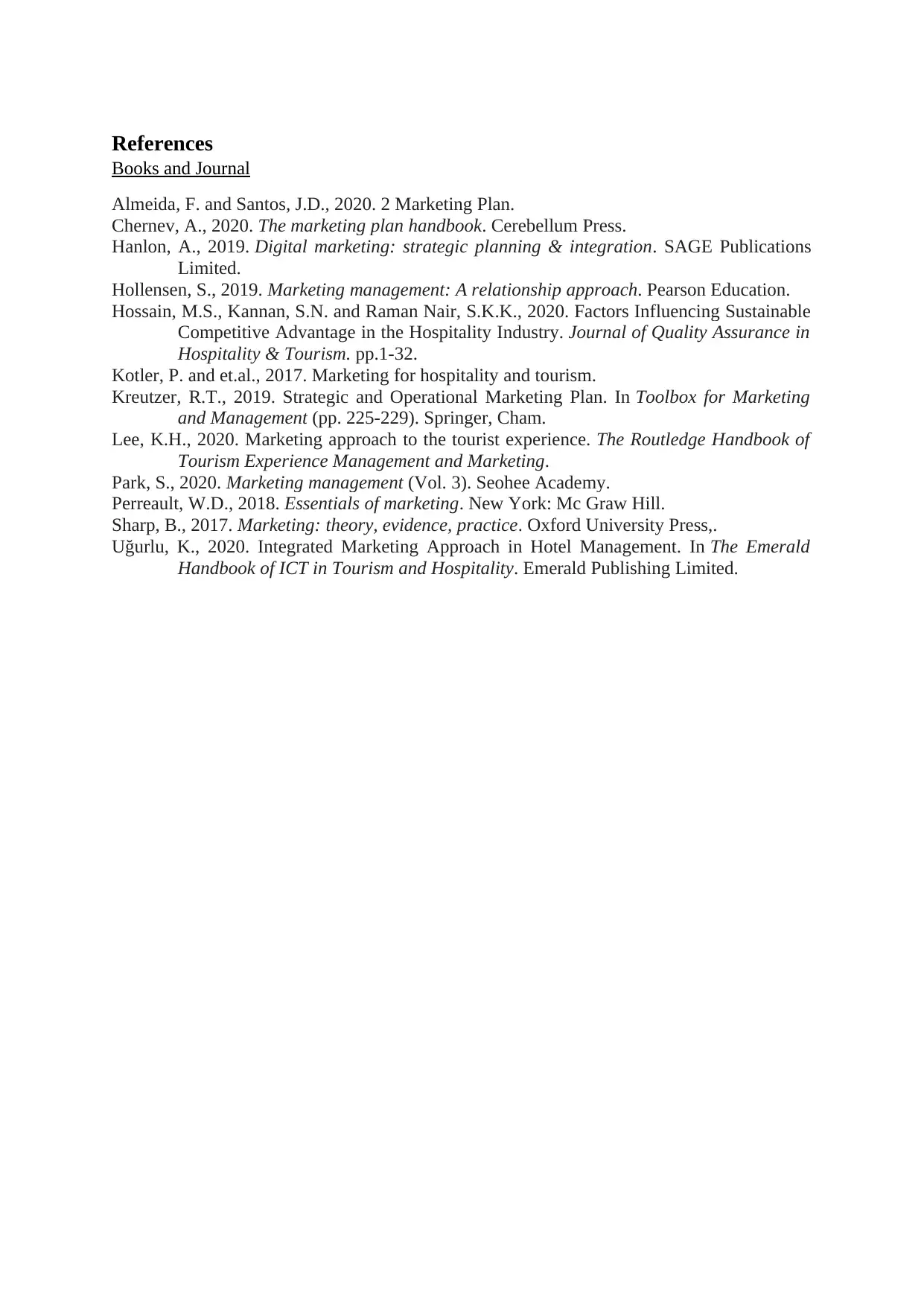
References
Books and Journal
Almeida, F. and Santos, J.D., 2020. 2 Marketing Plan.
Chernev, A., 2020. The marketing plan handbook. Cerebellum Press.
Hanlon, A., 2019. Digital marketing: strategic planning & integration. SAGE Publications
Limited.
Hollensen, S., 2019. Marketing management: A relationship approach. Pearson Education.
Hossain, M.S., Kannan, S.N. and Raman Nair, S.K.K., 2020. Factors Influencing Sustainable
Competitive Advantage in the Hospitality Industry. Journal of Quality Assurance in
Hospitality & Tourism. pp.1-32.
Kotler, P. and et.al., 2017. Marketing for hospitality and tourism.
Kreutzer, R.T., 2019. Strategic and Operational Marketing Plan. In Toolbox for Marketing
and Management (pp. 225-229). Springer, Cham.
Lee, K.H., 2020. Marketing approach to the tourist experience. The Routledge Handbook of
Tourism Experience Management and Marketing.
Park, S., 2020. Marketing management (Vol. 3). Seohee Academy.
Perreault, W.D., 2018. Essentials of marketing. New York: Mc Graw Hill.
Sharp, B., 2017. Marketing: theory, evidence, practice. Oxford University Press,.
Uğurlu, K., 2020. Integrated Marketing Approach in Hotel Management. In The Emerald
Handbook of ICT in Tourism and Hospitality. Emerald Publishing Limited.
Books and Journal
Almeida, F. and Santos, J.D., 2020. 2 Marketing Plan.
Chernev, A., 2020. The marketing plan handbook. Cerebellum Press.
Hanlon, A., 2019. Digital marketing: strategic planning & integration. SAGE Publications
Limited.
Hollensen, S., 2019. Marketing management: A relationship approach. Pearson Education.
Hossain, M.S., Kannan, S.N. and Raman Nair, S.K.K., 2020. Factors Influencing Sustainable
Competitive Advantage in the Hospitality Industry. Journal of Quality Assurance in
Hospitality & Tourism. pp.1-32.
Kotler, P. and et.al., 2017. Marketing for hospitality and tourism.
Kreutzer, R.T., 2019. Strategic and Operational Marketing Plan. In Toolbox for Marketing
and Management (pp. 225-229). Springer, Cham.
Lee, K.H., 2020. Marketing approach to the tourist experience. The Routledge Handbook of
Tourism Experience Management and Marketing.
Park, S., 2020. Marketing management (Vol. 3). Seohee Academy.
Perreault, W.D., 2018. Essentials of marketing. New York: Mc Graw Hill.
Sharp, B., 2017. Marketing: theory, evidence, practice. Oxford University Press,.
Uğurlu, K., 2020. Integrated Marketing Approach in Hotel Management. In The Emerald
Handbook of ICT in Tourism and Hospitality. Emerald Publishing Limited.
1 out of 10
Related Documents
Your All-in-One AI-Powered Toolkit for Academic Success.
+13062052269
info@desklib.com
Available 24*7 on WhatsApp / Email
![[object Object]](/_next/static/media/star-bottom.7253800d.svg)
Unlock your academic potential
Copyright © 2020–2026 A2Z Services. All Rights Reserved. Developed and managed by ZUCOL.




